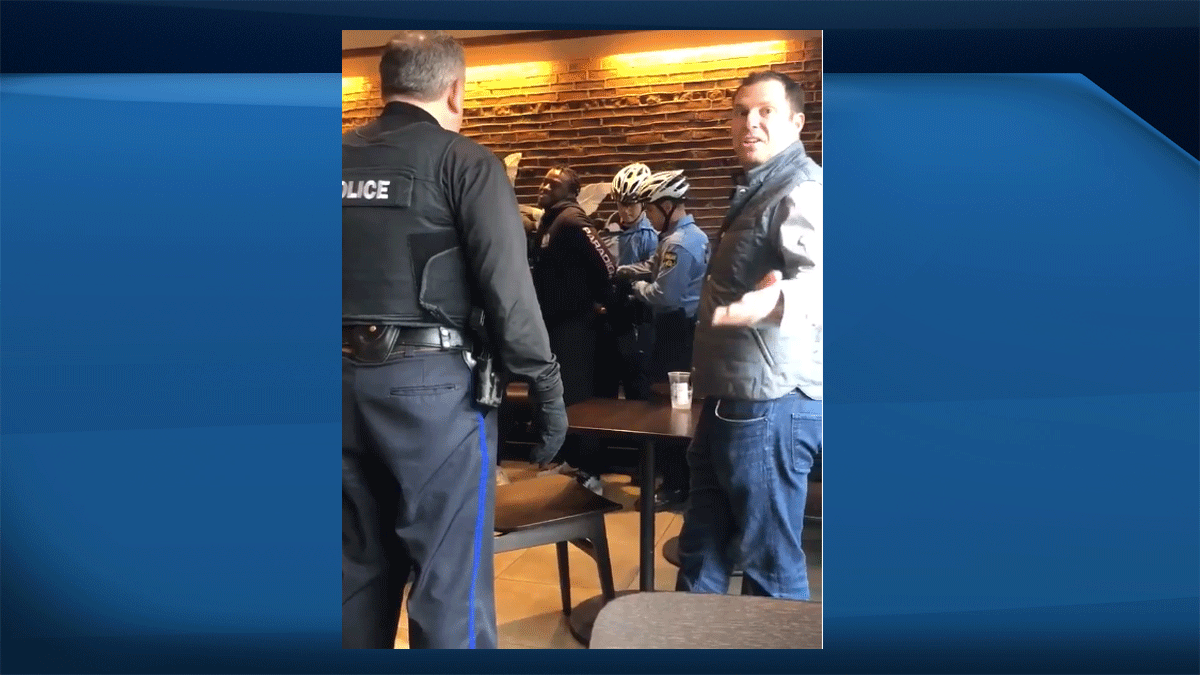This is what it’s like to go shopping as a black person in Canada, according to consultant Tomee Elizabeth Sojourner-Campbell:

You walk into a store and suddenly you have a shadow, she says. A clerk follows a few paces behind you, watching your every move and checking inventory each time you pause in an aisle. You buy a few things, but you’re stopped at the exit to show your receipt. No one else is.
It’s often subtle but can quickly escalate, she says, as demonstrated in a Philadelphia coffee shop last month when two black men were arrested while waiting for a business associate.
The viral video of the Starbucks incident is a shocking illustration of racism in America. But for black, Indigenous and many other people of colour in Canada, it’s life, says Sojourner-Campbell, a Toronto-based consumer racial profiling expert with Sojourner Mediation and Consulting Services.
“It’s an everyday issue that happens to people as they go about their business,” she says.
“It may sound egregious to people that don’t experience it, but for black and Indigenous people it’s part of daily life.”
As Seattle-based Starbucks Corp. prepares to close 8,000 U.S. cafes Tuesday afternoon for racial-bias training – Starbucks Canada will follow suit next month – experts are drawing attention to racial profiling north of the border.
WATCH: Black men arrested at Philadelphia Starbucks settle with $1 each, $200K pledge for entrepreneurs

A rash of recent incidents in Canada underscores the ubiquity of the problem here.

Get daily National news
Last month, a Toronto restaurant was ordered to pay $10,000 after asking black customers to prepay for a meal in 2014, while Shoppers Drug Mart was ordered to pay $8,000 in 2015 after a worker targeted a black woman and accused her of stealing.
In Saskatchewan, a Giant Tiger employee in Regina was suspended last year amid racial profiling allegations after an Indigenous man posted a video showing him repeatedly being followed, while another video showed a Canadian Tire staff member accusing an Indigenous man of shoplifting and physically removing him from a store.
“It can happen in small communities or large urban areas,” says Sojourner-Campbell. “Black and Indigenous people are racially profiled and poorly treated everywhere in Canada.”
In Nova Scotia, the provincial human rights commission found that staff at a Halifax-area Sobeys discriminated against a black woman when they falsely accused her of repeatedly stealing.

Andrella David was buying ice cream in May 2009 when a staff member approached her and publicly accused her of being a “known shoplifter.” The grocery giant initially appealed the ruling, saying that although the situation wasn’t properly handled she was not racially profiled.
Sobeys agreed to apologize and offer staff training on discrimination and racial profiling after public outcry prompted a months-long boycott.
El Jones, a Halifax poet and community organizer, says black people are seen as a threat and treated like criminals.
“The perception is that you’re a criminal, you’re dangerous and you’re threatening,” says Jones, Nancy’s Chair in Women’s Studies at Mount Saint Vincent University in Halifax.
The impact of racial profiling is hard to understand for those who don’t experience it, she says.
“Think about how you go about your day. Now imagine having to second guess everything you do,” Jones says. “Black people have to think twice before they do anything. Everything about your body you have to manage and control at all times.”
Encountering racism on a daily basis is devastating for racialized people, says Robyn Maynard, a Montreal-based writer, activist and educator.
“We need to recognize this kind of profiling as punishment, a real kind of harm,” she says. “It has a horrific impact on young people.”
Maynard, the author of “Policing Black Lives: State Violence in Canada from Slavery to the Present,” says the roots of racial profiling can be traced back to segregation and slavery before that.
Consumer racial profiling is one instance of the continued racism people experience everyday, she says.
“Just being black and moving freely in public space is contentious,” Maynard says.
The consequences of racial profiling include black children being over-represented in the child welfare system, black students facing higher suspension rates and being streamed into lower tracks at school, she says.
“The Starbucks incident draws attention to a broader crisis that has been the reality of black commutes for hundreds of years.”
- Danielle Smith promises Alberta referendum over immigration, Constitution changes
- Porter flight from Edmonton loses traction, slides off taxiway at Hamilton airport
- Coffee-hockey combo — or breakfast beers? — for bleary-eyed Olympic fans
- Are Canadian jobs any safer than before Trump’s tariffs were struck down?







Comments
Want to discuss? Please read our Commenting Policy first.